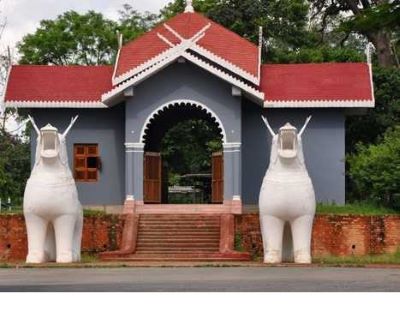Context-
The oath-taking event at Kangla Fort in Imphal, Manipur, orchestrated by 38 Meitei legislators, underscores a complex interplay of historical grievances, communal tensions, and political maneuvers. This analysis looks into the event's significance, the communal overtones embedded in the six-point oath, and the broader implications for Manipur's political landscape and India's federal structure.
Communal Overtones in the Oath
The six-point oath, endorsed by Manipur's Chief Minister N. Biren Singh, reverberates with communal overtones, particularly in its indictment of the 'Kuki' community for instigating violence. The points raised, including the abrogation of the Suspension of Agreement (SoO) with Kuki-Zomi-Hmar militants, the implementation of the National Register of Citizens (NRC) using 1951 as the base year, and the removal of 'Kuki' from the Scheduled Tribe list, signal a deliberate targeting of Kuki interests.
The omission of 'disarmament,' a crucial aspect highlighted in previous Assembly resolutions, underscores the legislators' failure to address the root cause of violence and disarm armed militias effectively. The event's orchestration by the Arambai Tenggol, an armed militia, further amplifies concerns regarding the politicization of violence and the erosion of democratic principles.
Abandonment of Constitutional Duty
The physical assault on dissenting legislators and activists during the event highlights the coercive tactics employed by the Arambai Tenggol to enforce conformity and stifle dissent. By capitulating to the militia's agenda, Meitei legislators jeopardize their constitutional duty and compromise India's democratic principles. The event underscores the vulnerability of elected representatives to external influences and the erosion of institutional integrity.
The symbolic significance of Kangla Fort as the venue for the oath-taking ceremony reflects the militia's attempt to reclaim Meitei heritage and project itself as the vanguard of indigenous traditions. However, the militarization of cultural symbolism and the subversion of democratic institutions pose profound challenges to Manipur's social cohesion and India's federal framework.
Dangers of Radicalization and Militarization
The Arambai Tenggol's ideological underpinnings, rooted in the revival of Meitei indigenous culture and sovereignty, parallel historical precedents of radicalization and armed insurgency. Similar to Bhindranwale's Damdami Taksal in Punjab during the 1980s, the militia mobilizes disaffected youth under the guise of cultural revivalism, leveraging traditional martial arts and nationalist rhetoric.
The convergence of radical agendas and communal tensions within Manipur's insurgency landscape underscores the fragility of peace-building efforts and the insidious influence of non-state actors. The Arambai Tenggol's emergence as a potent political force reflects broader socio-political fissures and underscores the imperative for nuanced governance strategies to address underlying grievances and prevent further escalation.
The group, known as Arambai Tenggol (AT), has extended invitations to all Members of the Legislative Assembly (MLAs) to attend the meeting. The primary agenda of the gathering is for political leaders to articulate their stance on the recent surge of violence in Manipur. The catalyst for AT's call to convene was the tragic deaths of four woodcutters, a village defense volunteer, and two police commandos, suspected to be at the hands of insurgents in the past fortnight.
A special delegation comprising three members from the Home Ministry arrived in Imphal on Monday night to engage in discussions with AT representatives. Headed by AK Mishra, the advisor on northeast affairs to the Home Ministry, the team met with AT leaders at the residence of Rajya Sabha MP Leishemba Sanajaoba.
Simultaneously, 35 MLAs, including leaders from the Naga tribes, have urged the Central government to annul the Suspension of Operations (SoO) agreement with 25 Kuki insurgent groups. Should this demand remain unmet, the leaders have hinted at taking "appropriate action" after consulting with the populace. Speculation suggests this action may entail the resignation of MLAs, potentially jeopardizing the stability of Manipur's BJP-led government in the 60-seat state assembly.
The MLAs underscored their resolution by emphasizing that the security forces could initiate a comprehensive operation against Kuki insurgents once the tripartite SoO agreement, signed between the Centre, the state, and the 25 Kuki insurgent groups, is permanently terminated.
Manipur's Security Adviser, Kuldeep Singh, recently informed reporters about the potential threat of insurgents from Myanmar targeting security forces in the border town of Moreh. However, concrete evidence supporting these claims is yet to emerge.
Implications for Indian Federalism
The Kangla Fort oath event resonates beyond Manipur's borders, signaling broader implications for Indian federalism and constitutional governance. The acquiescence of elected representatives to militia dictates undermines the foundational principles of democratic governance and poses existential threats to India's pluralistic ethos.
The Indian state's response to the oath-taking ceremony represents a litmus test of its commitment to upholding constitutional norms and preserving social cohesion. The failure to confront armed militias and protect minority rights risks exacerbating inter-community tensions and eroding public trust in democratic institutions.
Conclusion
The Kangla Fort oath event epitomizes the nexus between communal politics, militant activism, and constitutional decay in Manipur. The six-point oath, endorsed by Meitei legislators under duress, underscores the erosion of democratic values and the instrumentalization of violence for political ends.
The Indian state must confront the challenges posed by armed militias and uphold the principles of constitutional governance and social justice. The Kangla Fort oath event serves as a stark reminder of the fragility of India's federal framework and the imperative for concerted efforts to safeguard democratic institutions and promote inclusive governance.
In conclusion, the event underscores the urgent need for dialogue, reconciliation, and institutional reform to address the root causes of violence and promote enduring peace in Manipur and beyond
|
Probable Questions for UPSC Mains Exam-
|
.Source - The Hindu







